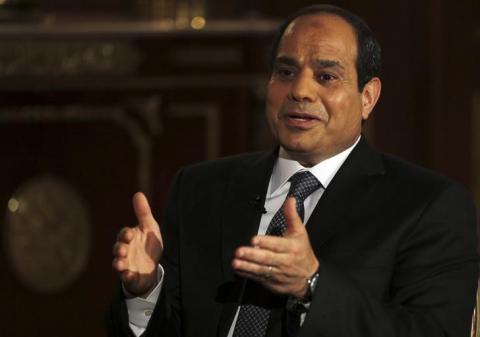Advertisement
Egypt's Sisi cracks the whip on new government
CAIRO (Reuters) - Egyptian President Abdel Fattah al-Sisi ordered a military-style regime of early morning starts for ministers on Tuesday as he swore in a new government that hopes to revive an economy plagued by sluggish growth and recent political turmoil.
After summoning Prime Minister Ibrahim Mehleb's cabinet to the presidential palace to take the oath of office at 7 a.m., the former army chief promptly made clear that ministers should get used to the new timetable.
"Every minister will be at his desk by seven," Mehleb told journalists after the government held its first meeting with Sisi, a marathon seven-hour session following the swearing in.
Mehleb, reappointed by Sisi after the president's landslide election victory three weeks ago, retained key economic and security ministers in his cabinet but restored the post of investment minister to attract foreign funding.
Egypt's economy is forecast to grow at just 3.2 percent in the fiscal year that begins on July 1, well below levels needed to create sufficient jobs for a rapidly growing population of 86 million and to ease widening poverty.
The turmoil of the last three years, when two presidents were overthrown, hundreds of people were killed and tourism and investment were battered, have contributed to high unemployment and a widening budget deficit.
The government will also have to tackle the legacy of decades of corruption and red tape and a costly subsidy system - fuel subsidies alone cost the state nearly $19 billion a year.
"This stage will not tolerate experimentation, failure or hesitation. That was completely clear from his instructions," Mehleb said after the cabinet meeting.
The sense of urgency and purpose echoed the tough love which Sisi offered during his election campaign last month, which emphasised hard work and austerity.
"Hard work is all I have, and all I will ask from you, read one election poster alongside a picture of candidate Sisi.
The president marked his first weekend in office by getting up at dawn and cycling nearly 20 km (12 miles) to raise awareness of how much money is wasted on the fuel subsidies.
INVESTMENT HOPES
Asked by a journalist whether the tough new ministerial regime would trickle down to ministry employees - many of whom keep notoriously slack working hours - Mehleb smiled and said his colleagues would seek to lead by example.
He added that Sisi had told the ministers he would head monthly follow-up meetings to evaluate the cabinet's progress.
The new cabinet includes 34 ministers, of whom 14 were newly appointed. Just four of the ministers are women.
The creation of a separate investment ministry, headed by veteran banker Ashraf Salman, reverses a decision earlier this year to merge the ministry with that of industry and trade.
Salman, a U.S.-educated investment banker is the co-founder and co-CEO of Cairo Financial Holding, an Egyptian asset management, corporate finance and investment banking firm.
He previously held a senior position at Arab African International Bank-Egypt and has worked on privatisation policies, according to the Cairo Financial Holding website.
"He knows the private sector inside Egypt and outside," said Hussein Sabbour, president of the Egyptian Businessmen's Association, saying that his connections made him a good choice.
"When he was in the investment banking sector he worked with a lot of Arab investors working in Egypt from Saudi Arabia and other places," Sabbour added.
Over the past two years Egypt has depended on aid from wealthy Gulf Arab allies who sent more than $20 billion worth of grants, loans and petroleum products, according to numbers given by Sisi during his election campaign.
Other new faces in the government include former ambassador to Washington Sameh Shukri, who was appointed foreign minister, and Naglaa El Ahwany, a university professor who was named minister for international cooperation.
But most ministers are holdovers from the previous regime, including the ministers for finance, defence, interior, planning, oil, electricity, supplies and communications.
Keeping the cabinet largely intact could allow Sisi to quickly implement the kind of reforms urged by the Gulf states that gave billions of dollars in aid after Islamist President Mohamed Mursi was ousted by Sisi and the army last July.
(Additional reporting by Shadia Nasralla; Editing by Robin Pomeroy)



















Add new comment